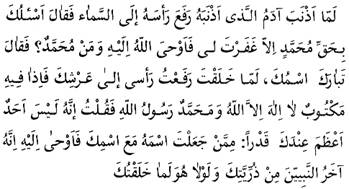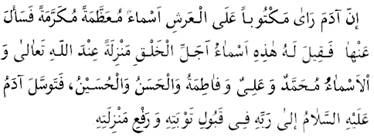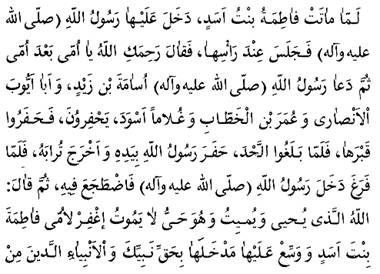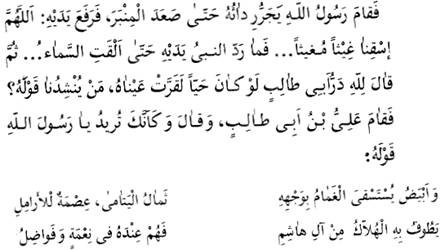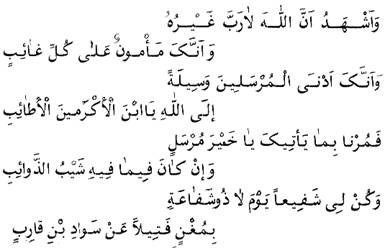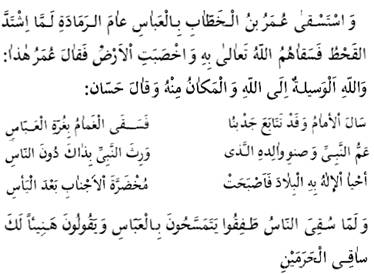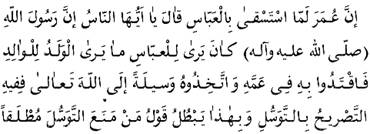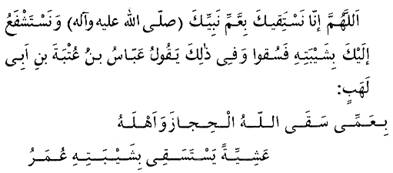 |
|
Wahhabism Ayatullah Ja'far Subhani Chapter 7 Tawassul to the beloved ones of Allah is a matter which is in vogue amongst the Muslims of the world and from the day the Islamic Shariat was conveyed through the Holy Prophet (s) its legality was also declared by the way of Islamic traditions. It was only in the 8th century A.H. that tawassul was rejected by Ibn Taymiyya and two centuries later Muhammad ibn ’Abd al-Wahhab intensified this objection. Tawassul was introduced to be unlawful and heresy and occasionally was labelled as worshipping the awliya And it is needless to mention that worshipping other than God amounts to polytheism and is forbidden. We shall later on have a separate discussion regarding the meaning of worship ('ibada) and we shall remind you that tawassul to the divine leaders on the one hand will be counted as worship and polytheism and on the other hand will be considered as desirable and mustahab having no sign of worship. However, we shall not discuss them here. What is important to know is that tawassul to the awliya Allah is done in two ways: 1. Tawassul to themselves. For example we say:
“O Lord I take recourse to your Messenger Muhammad (s) in order that you fulfil my wish.” 2. Tawassul to their position and reverence before Allah and their rights. Like we say:
“O Lord I take their position and their respect which they have before Thee as the means for my need to be fulfilled by Thee.” From the viewpoint of the Wahhabis, both these types are declared to be forbidden whereas the Islamic traditions and the practice of the Muslims bear witness contrary to the views of the Wahhabis and recommend tawassul of both these types. At first, we shall mention the Islamic traditions one by one and then state the practice of the Muslims. By paying attention to both these reasonings, the matter of heresy and unlawfulness will automatically cease to exist. But, whether tawassul to divine leaders amounts to their worship or not will be discussed in the section of ‘meaning of worship’ and that section will be the most insightful part of our discussion. Traditions There are many traditions mentioned in the traditional and historical books which bear testimony to the correctness and verity of the matter of tawassul to the divine leaders themselves and their position. Here, we mention a part of those traditions: First Tradition - Tradition of ‘Uthman ibn Hunayf
A blind person aproached the Holy Prophet (s) and said: “Request Allah to cure me.” The Holy Prophet (s) replied: “If you wish so I will pray for you but be patient for that is much better.” The blind man asked the Holy Prophet (s) to pray for him. The Holy Prophet (s) ordered him to take proper Wuzu and then recite two Raka't (units) of salat and this ‘Dua’: O’ Lord! I request from Thee; I pay attention to Thee through (the channel) of your prophet Muhammad, Your blessed prophet. O Muhammad, I turn to my Lord for the fulfillment of my need through you so that my need is answered. O Lord, accept his intercession for me…. A Word about the Reference of this Tradition The authenticity and verity of the reference needs no word from us. Even the leader of the Wahhabis i.e. Ibn Taymiyya has declared its reference to be correct and has said that by Abu Ja'far whose name has come in the sanad of the tradition is meant Abu Ja'far al-Khutami and he is a reliable man. [1] Al-Rifa'i, a contemporary Wahhabi writer who strives to cast down the credibility of the traditions on tawassul, says with regard to this tradition as such:
“Undoubtedly this tradition is correct and well-known."[2] In the book of al-Tawassul,
Rafa'ee says: “This tradition has been mentioned by al-Nasa'i, al-Bayhaqi,
al-Tabarani, al-Tirmidhi and al-Hakim in his al-Mustadrak and two recent
writers have inserted the sentence
Zayni Dahlan writes in Khulasat al-kalam that: “This tradition has been narrated - with reliable chains of narration - by al-Bukhari, Ibn Maja, al-Hakim in his al-Mustadrak and Jalal al-Din al-Suyuti in his al-Jami'”. The writer narrates this tradition from the following references: 1. Sunan Ibn Maja, vol 1 page 441 from the publications of Dar Ihya al-kutub al-'arabiyya, (ed. by Muhammad Fu'ad 'Abd al-Baqi), tradition no. 1385. Ibn Maja narrates from Abu Ishaq
‘This tradition is correct’ Thereafter he adds: "al-Tirmidhi has narrated this tradition in the book of Abwaab-ul-Adeeya and said
‘This tradition is truly correct and Gharib’ 2. Musnad Ahmad ibn Hanbal vol. 4 page 138. He has narrated this tradition in three ways from the Musnad of ‘Uthman ibn Hunayf printed from al-Maktab al-Islami, Mu'assassa Dar Sadir, Beirut. 3. al-Mustadrak of al-Hakim vol. 1 page 313 printed from Hyderabad. After narrating the tradition he says:
“This tradition is correct according to the criteria set by the shaykhayn and they have not narrated it”. 4. Al-Jami' al-Saghir written by al-Suyuti narrated from al-Tirmidhi and Mustadrak al-Hakim page 59. 5. Talkhis al-Mustadrak written by al-Dhahabi (died in 748) which is printed below al-Mustadrak. 6. Al-Taj al-Jami' vol. 1 page 286. This book is the collection of the traditions of the five books of Sihah except Ibn Maja. Therefore it is needless to speak and discuss about the reference of this tradition. You hand over this tradition to somone who is acquainted with Arabic language and a person whose mind is completely free from the controversies of the Wahhabis in the matter of tawassul and ask him what the Holy Prophet (s) has commanded him in the du'a which he taught the blind man and how he guided him as to how one's ‘Duas’ are easily answered! He will immediately reply: “The Holy Prophet (s) has taught him to consider the blessed Prophet as a channel and to seek tawassul from him and ask God to fulfil his wish. This matter can easily be understood from the following sentences:
O lord, I ask Thee and turn towards Thee through the channel of your Prophet. The word
In clearer terms, he asks from God through the channel of ‘Nabi’ and also turns to God through him. Moreover by ‘Nabi’ is meant Nabi himself and not the ‘Dua’ of Nabi; to imagine that it means the du'a of Nabi is deficieint of any reason. Anyone who predetermines the word of du'a has no reason other than pre-judgement since, the one who commends such a word and does not think Tawassul to people to be correct forcibly strives to predetermine the word of ‘Dua’ so that nobody opposes his idea and eventually he may say: “It means tawassul to the ‘Dua’ of the Prophet (s) and not the Prophet himself and tawassul to the ‘Dua’ of someone is proper.
In order to
clarify that asking God for the Sake of the Prophet and paying attention to Him
through His channel is the right purpose, the word of
(C) The
sentence
(D) The sentence
With this explanation all the five objections which the Wahhabi writer al-Rifa'i has mentioned in the book al-Tawassul ila haqiqat al-tawassul is done away with and we have brought the details of the objections and their reply in our book, al-Tawassul. Interested readers can refer to them on pages 147 to 153. Second Tradition: Tawassul to The (Right) Of Questioner 'Atiyya al-'Awfi narrates from Abu Sa'id al-Khudri that the Holy Prophet (s) said: “Anyone who leaves his house for salat and recites in this state the following du'a, he will meet the mercy of Allah and one thousand angels will seek forgiveness for him.” [4]
‘O God I ask Thee by the right of the questioners and by the honour of the steps which I take in Thy direction, I have not left the house for the purpose of disobedience or recreation or hypocrisy. I have left for keeping away from Thy anger and achieving Thy satisfaction. I ask Thee to keep me away from the Fire and forgive my sins for nobody forgives the sins except Thee’. This tradition clearly bears testimony to the fact that man, while asking God for his need to be fulfilled can take the position and status of a pious person as his channel and the reasoning of this tradition brings to light our objective. [5] Third Tradition: Tawassul to the Right of Holy Prophet (s) After disobedience of Allah, Adam (‘a) in the light of the words which were manifested from God, repented as Qur’an says:
Then adam received (some) words from his lord, so He turned to him mercifully; surely He is oft-returning (to mercy), the Merciful. (Baqarah: 37) Regarding the
interpretation of
Al-Tabarani in Al-Mu'jam al-saghir, al-Hakim Naysaburi in al-Mustadrak, Abu Nu'aym al-Isfahani and al-Bayhaqi in the book of Dala'il al-nubuwwa, Ibn 'Asakir al-Shami in his al-Ta'rikh, al-Suyuti in al-Durr al-Manthur and al-Alusi in Ruh al-Ma'ani [6] have narrated from ‘Umar ibn al-Khattab that the Holy Prophet (s) has said:
When Adam committed the sin he raised his head towards the sky and said (O God) I ask Thee by the right of Muhammad that You forgive me. God revealed to him: “Who is Muhammad?” Adam replied: When You created me, I raised my head towards the ‘Arsh’ (Throne) and I saw that on it was written “There is no God except Allah and Muhammad is the Messenger of Allah. I said to myself that Muhammad must be His greatest creature that Allah has kept His name besides his own name. At this moment, it was revealed to him that Muhammad was the last of the Prophets from his Progeny and if it was not for Muhammad, God would have not created him. Our View about this Tradition: 1. In the
Holy Qur’an the word of
“That Allah gives you the good news of Yahya verifying a Word from Allah,” (Aal-Imran:39) “O Maryam, surely Allah gives you good news with a Word from him (of one) whose name is the Messiah, Isa son of Maryam.” (Aal-Imran:45)
“The Messiah, Isa son of Maryam is only an Apostle of Allah and His Word,” (Nisa: 171)
Say: If the sea were ink for the words of my Lord.(Kahf: 109) ..
"With seven more seas to increase it, the words of Allah would not come to an end.” (Luqman: 27) Considering
that the word of
Adam saw the names which were written in ‘arsh (throne) and did tawassul to them. It was told to him that these names were the most honourable creatures of Allah and they were Muhammad, 'Ali, Fatima, al-Hasan and al-Husayn. Adam repented by doing tawassul to them. Another Shia tradition mentions that Adam saw the sparkling light of these five personalities. For knowing this tradition, please refer to Tafsir al-burhan. [9] 2. By referring to the historical and traditional books it becomes clear that tawassul of Adam ('a) to the Holy Prophet (s) was one famous and well-known matter. As, Imam Malik told Mansur al-Dawanaqi in the shrine of the Holy Prophet (s) as such:
“He (Holy Prophet) is your clannel and your father, Adam's channel.” The Islamic poets have put this reality into a form of verse
On account of him, Allah accepted the ‘Dua’ of Adam and saved Noah inside the ship. They are such people through whom Adam's sin was pardoned and they are those who are the channels to Allah and the sparkling stars. [11] Fourth Tradition: Tawassul of Prophet (s) by the Right of Prophet (s) and by the Rights of Previous Prophets
When Fatima, daughter of Asad passed away and the Holy Prophet (s) was informed about her death he came and sat besides her and said: ‘O my mother after my mother, may God have mercy upon you. Then he asked Usama, Abu Ayyub, ‘Umar ibn al-Khattab and a black slave to prepare one grave. When the grave was ready the Holy Prophet (s) made a niche in the side of the grave and buried her with his own hands and then recited this ‘Dua’: 'O Allah the One who gives Life and Death: the One who is All-Living and never dies, Have mercy on Fatima daughter of Asad and make her abode vast by the right of your Prophet and the Prophets who came before me.’ The writer of Khulasat al-kalam says:
“This tradition is narrated by al-Tabarani (in his al-Mu'jam), Ibn Hibban and al-Hakim and they have confirmed its authenticity”. [12] Sayyid Ahmad ibn Zayni Dihlan writes in the book al-Durar al-saniyya fi al-radd 'ala al-wahhabiyya as such:
The famous traditionist Ibn Abi Shayba has narrated this tradition from Jabir. Ibn 'Abd al-Barr and Abu Nu'aym too have narrated this tradition from Ibn 'Abbas and Anas respectively. Jalal al-Din al-Suyuti has brought all these matters in al-Jami' al-kabir.[13] The writer narrates this tradition in the afore-mentioned form from two books that some of them contains the supplication related to our discussion while others do not. 1. Hilyat al-'awliya (Abu Nu'aym al-Isfahani, vol. 3 page 121. 2. Wafa' al-wafa' (al-Samhudi} vol. 3 page 899. Fifth Tradition: Tawassul to Prophet (s) Himself Some of the Islamic traditionists have narrated that an Arab accompanied with some villagers approached the Holy Prophet (s) and said:
“We have come to you while we are neither having a camel with us to groan nor a child to sleep”. Thereafter he recited these poems
We have come to you while blood drops from the bossom of the horses; the mother has been restrained from her baby. We are not having anything with ourselves for people to eat except for bitter leaves which they eat in the year of famine and some bad food from wool and blood. We are having no alternative but to seek shelter in you, and in whom can people seek shelter except the Prophets. Then,
The Holy Prophet (s) said:
‘Yes, my objective was the same as you have recited.’ Then Ali (‘a) read a portion of his elegy and the Holy Prophet (s) asked blessings for Abu Talib on top of the pulpit.’ After this a man from the tribe of Bani Kanane stood up and recited some lines where the first line meant as follows: “All the praise is for You. O Allah; praise from Your worthy slaves. By resorting to the Holy Prophet (s), we have become satiated by the rainfall.” Numerous references have been narrated for this portion but the writer has narrated from the following documents: a. 'Umdat al-qari fi sharh Sahih al-Bukhari, vol. 7 page 31 written by Badr al-Din Mahmud bin Ahmad al-'Ayni (died in the year 855) printed by Idara al-taba'a al-muniriyya. b. Sharh Nahjul-Balagha by Ibn Abi al-Hadid, vol. 14 page 80. c. al-Sira al-Halabiyya by 'Ali bin Burhan al-Din al-Halabi, vol. 3 page 263. d. al-Hujja 'ala al-dhahib ila takfir Abi Talib, written by Shams al-Din Abi 'Ali Fakhar bin Ma'ad (died in the year 630), printed in Najaf, 'Alawi press, page 79. e. Sira Zayni Dihlan in the margin of al-Sira al-Halabiyya, vol. 1 page 81. Sixth Tradition: Tawassul to the Self of Prophet (s)
I bear witness that there is no God except Allah. You (O Prophet) are trustworthy upon every hidden thing from the senses. From amongst the Prophets you are the most nearest channel towards Allah. O the son of the honourable and noble! you command us whatever you receive. O, the most righteous Apostle! Although acting upon your commands causes the hair on the head to turn white, you be my intercessor on the Day when the intercession of the intercessors will be useless for Sawad bin Qaa'reb even to the extent of string of dates. [16] Till here we were able to mention some of the traditions of tawassul which have come in the historical and traditional books of Ahl al-Sunnah. However in the traditions of Shi’a leaders, the matter of tawassul to holy personalities is so clear and obvious that it can be wittnessed in most of their ‘Duas’ (supplications). Should we
learn Islamic teachings and instructions from Ibn Taymiyya and Muhammad ibn
’Abd al-Wahhab or acquire them from the Household of the Messengership and the
progeny of the Holy Prophet (s) who by the order of Hadith al-Thaqalayn, are
Seventh Tradition: The Leader of the martyrs says in du'a 'Arafa
“O Lord at such a moment that You have made it obligatory and honourable upon me, I turn towards You by Muhammad, Your Prophet, Your Messenger and Your best of those created by You.” [18] Practise of the Muslims Regarding Tawassul The practise of the Muslims during the time of the Holy Prophet (s) and also after him was that they were always seeking ‘tabarruk’ to the awliya Allah themselves as well as to their position and status. Now we shall mention some of them here: (1). Ibn al-'Athir 'Izz al-Din 'Ali bin Muhammad bin Muhammad bin 'Abd al-Karim al-Jazari (died in 630 AH) writes in the book Usd al-ghaba fi ma'rifat al-sahaba as such:
In the year when famine reached its peak, ‘Umar requested for rain through the channel of Abbas. God satiated them through him and every place became green. Thereafter ‘Umar faced the people and said: “I swear by Allah that al-'Abbas is our channel towards Allah and he is having a high station before Allah." Hassan ibn Thabit recited a poem in his honour and said: “When famine had severely engulfed the entire area, the Leader requested for rain." Thereafter the clouds in the sky, through the brightness of al-'Abbas satiated the people. Al-'Abbas who is the Uncle of the Prophet (s) and alike the father of the Prophet (s) has inherited such a position and status from him. Almighty Allah enlivened the places through him and every spot began to be filled with greenery after despair and disappointment. When it rained, people everywhere started seeking tabarruk by touching the body of al-'Abbas and they said: Bravo O Saqi (cupbearer) of the two holy sanctuaries. [19] Observation of the period of history, an example of which has also benn mentioned in Sahih al-Bukhari, shows that one of the means of tawassul was through the honourable personalities who were embodiment of nearness (to God) and meritorious and possessed virtues that make them suitable for tawassul. What an elegant manner to express this is to say:
‘This is by God a means for seeking nearness to God and at His House’ (2). Al-Qastallani (died in the year 923 AH), who was a contemporary to Jalal al-Din al-Suyuti, writes in his book al-Mawahib al-ladunniyya bil-manha al-muhammadiyyah fil seerat al-nabawiyyah that has been printed in Egypt that:
“When ‘Umar requested for rain through Abbas he said: 'O people! The Holy Prophet (s) used to look at Abbas from a father's angle. You follow him and take him as your channel towards Allah.'" This action nullifies the notion and thought of those who have completely prohibited tawassul or have prohibited it for personalities other than Holy Prophet (s). [20] (3). When Mansur asked the grand Mufti of Medina, Malik bin Anas, whether he should face the qibla and recite du'a or face the Holy Prophet (s), the latter replied:
“Why do you turn your face away from him? He is your means and your father, Adam's channel on the Day of Judgement. You resort to him and take him as your intercessor as Almighty Allah accepts his intercession. Allah declares (in Quran) that if those who do injustice upon themselves..." [21] (4). Ibn Hajar al-Haythami in the book of al-Sawa'iq al-muhriqa (which al-Qadi Nurullah al-Shustari refuted under the title of al-Sawarim al-muhriqa) has narrated the following two couplets:
“The Household of the Holy Prophet (s) is my channel towards Allah and it is through their means that I have hope that my book of deeds will be given in my right hand." [22] By taking into consideration these testimonies and words, one can claim that the Holy Prophet (s) and the outstanding personalities are one kind of channel which Qur’an has ordered for that as:
“O you who believe! be careful of (your duty to) Allah and seek means of nearness to Him.” (Maida: 35) And
(5) al-Bukhari narrates in his al-Sahih as such:
During the period of famine, ‘Umar bin al-Khattab would take resort to al-'Abbas bin 'Abd al-Muttalib and say: ‘O God ! previously we were taking resort to Your Prophet and You were sending Your mercy on us; Now we take resort to Your Prophet's uncle send Your mercy on us.' At this moment it started to rain and everything got satiated. [23] There is nothing to be said about the authenticity and consensus regarding this tradition. Even al-Rifa'i who, under various pretexts, rejects the reliable traditions on tawassul has admitted the authenticity of this tradition and says:
“Certainly this tradition is correct….If the purpose of the tradition is a proof upon the correctness of tawassul to people then we are the first people to take the step to accept that purpose and act upon it.” [24] By paying attention to the sentences of the Caliph himself which he narrates to al-'Abbas about tawassul and especially when he swears by Allah
This is by God a means for seeking nearness to God and at His House [25] It becomes clear that the reality of tawassul in this case is tawassul to the self or to the position and status of al-'Abbas before God. In this regard, Muhammad bin Nu'man al-Maliki (died in the year 683 AH) narrates in his book Misbah al-zalam fi al-mustaghithin bi khayr al-'anam the manner of tawassul of ‘Umar to al-'Abbas as such:
"O God we ask for rain through the channel of thy Prophet's uncle and we take his authority and previous record in Islam as our intercessor. At this moment, the mercy of Allah showered upon everyone. 'Abbas ibn 'Utba ibn Abi Lahab recited a poem in this regard and said: 'By the blessings of my Uncle, the land of Hijaz and its inhabitants got satiated. And at sunset, ‘Umar did tawassul to his (Al-Abbas’s) virtouness.'" [26] In the same way, Hassan bin Thabit too recited a poem regarding this matter:
“The cloud satiated (everything) due to the sparkling face of Abbas”. Ibn Hajar al-'Asqalani says in the book of Fath al-bari fi sharh Sahih al-Bukhari: Al-Abbas in his du'a said:
“The people resorted to me because of the bond of relationship which I have with Thy Prophet”. [27] As the respected readers have observed, there is no place of doubt that the aim was tawassul to the position and status of Abbas and we are aware that from ancient times there is a saying that:
“Anytime, a judgement is derived from a topic, its content will be a testimony against the topic (and) a testimony upon the proof of judgement.” That is to say, if the Holy Qur’an says:
…Securing the necessities of life for the women is a matter concerning those whose wives bear children for them… (Baqarah: 233) It is a judgement due to expression of the reason of judgement and since women bring children for the men, their expenses in daily life should naturally be met by the men. If we say: A learned man and a scholar should be respected, it is because of his knowledge and wisdom. Therefore if
‘Umar says
‘Because of my status in relation to your Prophet.’ Taking into consideration these reasonings, we can decisively say that the Muslims in the beginning of Islam were doing ‘tawassul’ to the righteous and virtuous personalities. (6) Poem of Safiyya in grief of the Holy Prophet (s): Safiyya, daughter of Abd al-Muttalib and aunt of the Holy Prophet (s) recited a poem in grief of the Holy Prophet (s). Two of its lines are:
“O Prophet of God you are our hope. You were a righteous person and never did you oppress anyone. You were good and kind to us; O our Prophet, amongst your nation whosoever (claims to be) in grief should shed tears for you.” [28] This part of the poem which was presented in the presence of the companinons of the Holy Prophet (s) and which has been narrated by the historians informs us of the following points: Firstly, conversation
with the spirits or so to speak, the address to the Holy Prophet (s) after his
demise was an action which was permitted and was a common practice. As she
said: Secondly, by the decree
of the sentence
(1) Ibn al-Jawzi (died in 597) has written a book by the name of al-Wafa bi 'ahwal al-Mustafa', and has earmarked one chapter for tawassul to the Holy Prophet (s) and another chapter for ‘seeking shifa from his grave’. (2) Shamsuddin Muhammad bin Nu'man al-Maliki (died in the year 673 AH) has written a book by the name of Misbah al-zalaam fi al-mustaghithin bi khayr al-'anam and Sayyid Nur al-Din al-Samhudi has narrated a lot from him in his book Wafa' al-wafa' in the chapter of ‘Tawassul to the Holy Prophet (s)’. (3) Ibn Dawud al-Maliki al-Shadhili has brought in his book al-Bayan wa al-'ikhtisar the tawassul of scholars and pious people to the Holy Prophet (s) in difficulties and hardships. (4) Taqi al-Din al-Subki (died in the year 756 AH) has analyzed this matter in his book Shifa al-siqam pages 120 to 133. (5) Sayyid Nur al-Din al-Samhudi (died in the year 911 AH) has discussed this matter and brought testimonies to it in his book Wafa al-wafa' , vol. 2, pages 413 to 419. (6) Abu al-'Abbas al-Qastallani (died in the year 932 AH) in his book al-Mawahib al-ladunniyya. (7) Abu 'Abdulla al-Zurqani al-Maliki (died in the year 1122 AH) in his book Sharh al-Mawahib al-ladunniyya vol. 8 page 317. (8) al-Khalidi al-Baghdadi (died in the year 1299 AH) author of Sulh al-'Ikhwan. Apart from this, he has written a risala (treatise) in reply to Sayyid Mahmud al-'Alusi Baghdadi about tawassul to the Holy Prophet (s) and has been printed in the year 1306 AH. (9) al-'Adawi al-Hamzawi (died in the year 1303 AH) has discussed about tawassul in the book of Kanz al-matalib, page 198. (10) al-'Azami al-Shafi'i al-Quda'i', author of Furqan al-Qur'an. This book has been printed along with the book al-'Asma wa al-sifat of al-Bayhaqi in 140 pages. By referring to these books some of which have presented the facts and most prominent amongst them being Sulh al-'Ikhwan and Furqan al-Qur'an, one can know what was the practise of the Muslims in every period concerning tawassul to the Holy Prophet (s) and will reveal the exaggerations of Ibn Taymiyya and followers of his deviated ideology of Wahabism. In the end, we shall once more remind you of what Qur’an says:
"O you who believe! be careful of (your duty to) Allah and seek means of nearness to Him and strive hard in His way that you may be successful". (Mai'da: 35)
This verse in general orders to seek tawassul but what exactly is tawassul is not mentioned in this very verse. There is no doubt that performing the religious duties is a channel (for tawassul) but it is not confined to this meaning only. Instead by paying attention to the short history of tawassul to the awliya Allah, it will become clear that this action itself is one of the channels. Moreover, this matter will fully become clear by referring to the conversation of Imam Malik with Mansur and also the incident of the second Caliph requesting for rain by doing tawassul to al-'Abbas, the uncle of the Prophet (s).
Footnotes: [1] In al-Musnad of Ahmad, Abu Ja'far has come with the word of Khutami although in Sunan of Ibn Maja Abu Ja'far has come independently. [2] al-Tawassul ila haqiqat al-tawassul, page 158. [3] Same reference. [4]
[5] The
command which has come in the verse of
[6] Mustadrak al-Hakim, vol. 2 page 615; Ruh al-Ma'ani vol. 1 page 217; al-Durr al-Manthur, vol. 1 page 59 narrated from al-Tabarani, Abu Nu'aym al-Isfahani and al-Bayhaqi. [7] The text of the hadith is taken from al-Durr al-Manthur and differs slightly from the text of al-Hakim in his al-Mustadrak although both are same in their contents. [8] Majma' al-bayan vol. 1 page 89; Tafsir al-burhan, vol.1. page 86-88; ahadith no .2, 5, 11, 12, 14 and 27. [9] Tafsir al-burhan, vol. 1 page 87 ahadith no.13, 15 and 16. [10] Sayyid Ahmad Zayni Dihlan writes in the both al-Durar al-saniyya, page 10 that al-Qadi 'Iyad has narrated this incident with correct reference. Imam al-Subki in his book Shifa al-Saqam, al-Samhudi in Wafa' al-wafa', and al-Qastallani in al-Mawahib al-ladunniyya. Ibn Hajar said in al-Jawhar al-munazzam that this incident has been narrated with correct references. Al-'Allama al-Zurqani writes in Sharh al-mawahib that Ibn Fahd has narrated this with a good (hasan) chain of narration and al-Qadi 'Iyad has narrated it with an authentic (sahih) chain of narration. The text of the conversation of al-Mansur with Imam Malik will be mentioned later in the text. [11] Kashf al-'irtiyab, pages 307, 308. [12] Kashf al-'irtiyab, page 312 narrated from Khulasat al-kalam. [13] al-Durar al-saniyya, page 8. [14]
[15]
[16] al-Durar al-saniyya, page 27 written by Zayni Dihlan and al-Tawassul ila haqiqat al-tawassul, page 300 [17] al-Sahifat al-'Alawiyya, ad'iya of Amir al-mu'minin which al-Shaykh 'Abdallah Samahiji has collected. [18] Mafatih al-jinan, du'a 'Arafa. [19] Usd al-ghaba, vol. 3 page 111. Egyptian edition. [20] al-Mawahib al-ladunniyya, vol. 3 page 380 Egyptian edition and in Ibn Hajar Asqalani, Fath al-bari, vol. 2, page 413 (Lebanon print). It has also been reported in Sharh al-mawahib by al- Zurqani (1055 AH - 1122 AH). [21] Wafa' al-wafa', vol. 2 page 1376. [22] al-Sawa'iq al-muhriqa, page 178 (Cairo print). [23] Sahih Bukhari, chapter of Salat al-'istisqa, vol. 2 page 32. [24] Although, it was
worthy to say
[25] Usd al-ghaba, vol. 3. page 111. [26] Wafa' al-wafa', vol. 3 page 375 narrated from Misbah al-zalam. [27] Fath al-Bari, vol. 2 page 413 (print of Dar al-Ma'rifa Lebanon). [28] Dhakha'ir al-'uqba fi manaqib dhawi'l qurba, page 252 written by al-Hafiz Muhibb al-Din al-Tabari, born in 615 AH and died in 694 AH, (print of Maktab al-Quds, Cairo); and Majma' al-zawa'id, vol. 9 page 36, (2nd edition) written by al-Hafiz Nur al-Din al-Haytami. Let it not remain
unsaid that the sentence of
|





